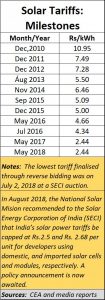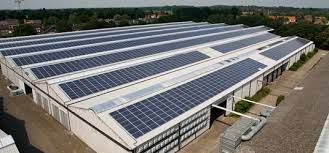https://www.moneycontrol.com/news/business/economy/cheap-solar-power-singes-state-electricity-boards-revenues-3682871.html
Solar power – the floodgates budge
RN Bhaskar — 22 March 2019
Last week, the Karnataka High Court quashed an order issued by the Karnataka Electricity Regulatory Commission (KERC) relating to an increase in wheeling charges for open access power consumers in the state. It thus brought relief to all renewable energy generators trading power through open access in that state (https://mercomindia.com/karnataka-court-order-wheeling-open-access/).
This case could make the case stronger for captive power producers on the one hand, and for rooftop solar power producers on the other for reasons that are explained a bit later. The court, in its order, reiterated the principle of settled contracts which lends certainty to power purchase agreements (PPAs) and imposes confidence in investors.
It all began when, in May 2018, KERC issued an order imposing high wheeling or transmission charges on renewable energy projects in the state. Units that were less than 10 years old (which actually means all units because advocacy of solar projects began less than 10 years ago), had to pay the additional transmission or wheeling charges fixed by the CERC in cash. This was a five-fold increase in wheeling charges for open access consumers in the state of Karnataka. The order was effective from April 1, 2018, and was to be in force till March 31, 2020.
Some renewable energy project developers operating in Karnataka filed writ petitions in the Karnataka High Court challenging this order.
The ruling
The court ruled that
- KERC had promised solar photovoltaic (PV) project developers that they would be exempted from wheeling charges for ten years after commissioning.
- KERC was wrong in first guaranteeing exemption and then seeking to remove that guarantee. Such exemptions if withdrawn were not in public interest and could lead to project developers and investors suffering monetary loss leading to issues in serviceability of loans and would also affect the economy.
- KERC’s action boils down to discriminatory treatment.
- KERC can only determine wheeling and banking charges prospectively not retrospectively.
- Renewable energy project developers do not have to pay the increased charges
 In fact, this is the problem all power suppliers especially renewable power producers) face when dealing with state-owned power utilities. States have sought to undermine the sanctity of contracts by imposing arbitrary charges. They have sought to reduce competition in the power generation space by levying charges that make competition extremely risky, hence difficult. They promote higher cost power generators and distributors. And they have sought to make renewable power more expensive than it ought to be.
In fact, this is the problem all power suppliers especially renewable power producers) face when dealing with state-owned power utilities. States have sought to undermine the sanctity of contracts by imposing arbitrary charges. They have sought to reduce competition in the power generation space by levying charges that make competition extremely risky, hence difficult. They promote higher cost power generators and distributors. And they have sought to make renewable power more expensive than it ought to be.
Almost all states impose charges like standby charges, capacity charges, and BED (Bombay Excise Duty) levies to ensure that surplus power sold by a private captive producer would not be allowed to undermine the profitability of more expensive conventional or grid-sourced power.
At the central level also, the government has slapped a 25% safeguard duty on solar panel imports – ostensibly to protect domestic producers of solar panel. It has thus promised promotion of solar power on the one hand, and slapped it will higher imposts on the other.
Finally, despite pious sounds being made about the need to promote rooftop solar, there are no indications that this is being done. On the contrary, it is almost certain that the government will slip on its targets for solar power in general and for rooftop power in particular (https://www.moneycontrol.com/news/trends/current-affairs-trends/comment-india-needs-to-be-more-ambitious-about-rooftop-solar-3604971.html).
Two reasons
But why do governments in India try to sabotage all plans relating to solar power and private distribution of power?
One reason is that solar power prices have spiralled downwards to levels not imagined before (see chart on India’s solar power tariffs alongside). That make solar power – inclusive of the battery – cheaper than conventional power. This is especially true for business establishments which pay around 8-12 rupees a kWh (unit). Obviously, when they can get power (inclusive of battery costs) at around Rs.6 a unit, why now save this money? And these prices are likely to continue sliding because batteries are likely to become even cheaper, and popular. As mentioned earlier, battery demand is likely to soar 15 times over the next few years, and prices expected to fall further (https://www.moneycontrol.com/news/india/opinion-govt-missing-the-big-picture-in-its-electric-vehicle-policy-3332341.html). As state grids end up selling less expensive power to companies (who can generate solar power in abundance from their factory roofs), states will have less money with which they can offer subsidised power to farmers and other vote banks. Hence the heartburn, and the desire to hike tariffs through the imposition of other levies.
 There is a second reason too. Most state governments know that power is stolen from state grids. But this theft is concealed, by deliberately mis-classifying the stolen power as agricultural consumption. To justify this, some states like Maharashtra actually show a higher population of pumpsets per acre of arable land – far in excess of actual numbers. Much of the power theft is believed to be linked to very powerful people often close to politicians. They run factories and other businesses on stolen power.
There is a second reason too. Most state governments know that power is stolen from state grids. But this theft is concealed, by deliberately mis-classifying the stolen power as agricultural consumption. To justify this, some states like Maharashtra actually show a higher population of pumpsets per acre of arable land – far in excess of actual numbers. Much of the power theft is believed to be linked to very powerful people often close to politicians. They run factories and other businesses on stolen power.
That in turn makes honest companies unviable on the one hand, and bankrupts state power grids on the other. Few states like the idea of enterprises using power independent of the control (and extortion) that grids used to exercise on them till now. Hence the disincentives. Clearly, the Indian government wants to do everything to stanch the growing popularity of solar power worldwide (see chart on the surging solar demand).
The centre as spoiler
The situation can become so terrible that the central government does not even listen to reason. Thus, in spite of promoting power to the remotest household, and paying lip service to solar power, it needed the chief minister of Tripura to personally plead with the union power ministry to allow his state to instal solar power facilities for the remotest households. His argument was simple. Grid connectivity would cost him at least Rs.2 lakh per household in the remotest region. There were over 50,000 such households in the state. Solar power connectivity would cost just Rs.50,000 each (http://www.asiaconverge.com/2019/03/biplab-kumar-deb-has-big-plans-for-tripura/). Moreover, the longer the grid wires, the more expensive would reaching the power become. There was also the risk of both the power and the wires getting stolen. The chief minister finally had his way, but only after he gave a written assurance to the centre that the state would pay for the solar power installations.
The central government also forgot that rooftop solar is an employment generator, and can create over 80 million jobs within a few years (http://www.moneycontrol.com/news/business/dear-pm-modi-heres-how-bureaucrats-are-planning-to-scuttle-your-rooftop-solar-employment-plans-2468501.html).
Forgotten were the rooftop solar targets, the economics and the employment generation. This is how pig-headed the central government too can get.
The Karnataka Court’s order is a harbinger of things to come. With solar costs plummeting, and the state grids nearing bankruptcy, expect changes in the power sector that few have imagined before.
The tide’s coming. It is unlikely that the bunds will withstand the force of the waves.







































COMMENTS